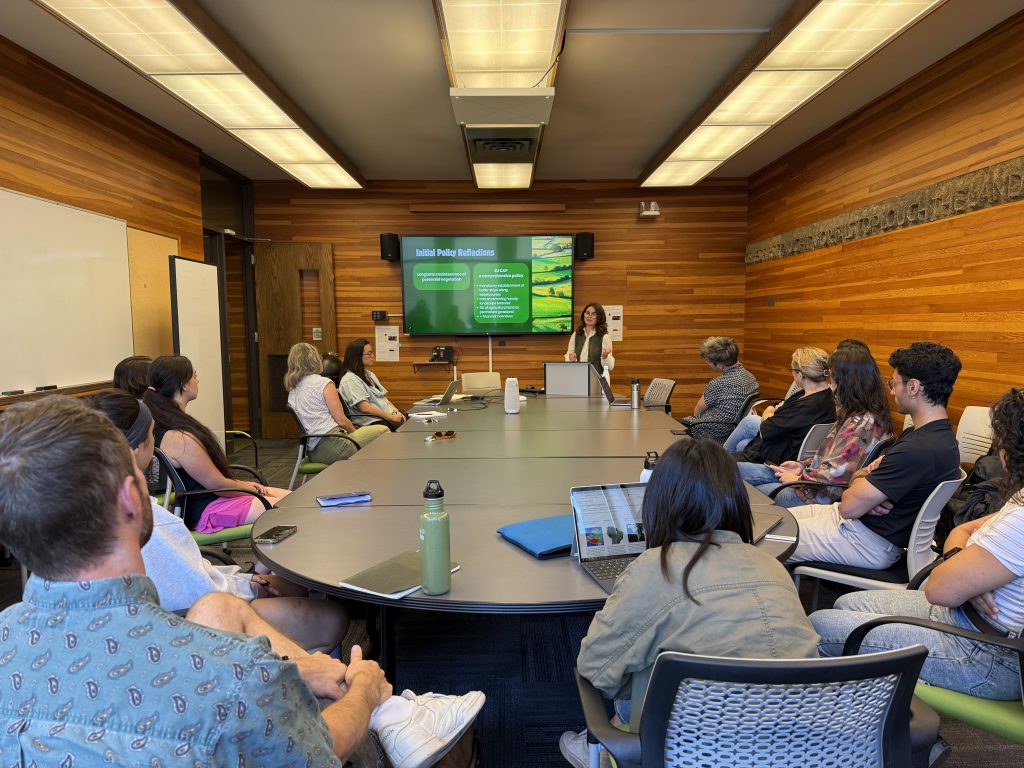

From Paris to Vancouver: UBC's CARE interns
“This experience showed me how important it is to engage in both advocacy and academic spaces. I had the privilege of meeting some of UBC’s most inspiring faculty members working at the intersection of climate justice, peace, and policy. I was deeply inspired by their stories and the impact their work has had throughout their careers.”
This summer, the School of Public Policy and Global Affairs (SPPGA) at UBC welcomed master’s students Anouk Bassou, Justine Babin, and Leo Ruesche Neggia from Sciences Po in Paris as part of the Climate Adaptation, Resilience and Empowerment (CARE) Internship Program. An innovative partnership between UBC, Sciences Po, the University of Toronto, and the University of Guelph, CARE offers immersive research opportunities that place students at the heart of climate-related inquiry and policy development.
Each student intern brought a unique academic background and personal motivation to their work, with projects reflected the interdisciplinary and globally engaged nature of the program:
Anouk Bassou: Bridging Agricultural Policy and Environmental Restoration
Anouk Bassou, a first-year master’s student in Environmental Policy at Sciences Po in Paris, worked under the supervision of SPPGA Professor and political ecologist Juliet Lu. Her research focused on the restoration of perennial plants in agricultural landscapes, a strategy that supports biodiversity, reduces pollution, and enhances carbon sequestration. “The farming system we have today has completely removed perennials throughout time to be more productive,” she said. “This has had many negative consequences… so what we’re trying to do is to switch the situation, meaning overturn this problem and restore what has been disrupted.”
Drawn to the opportunity to study agriculture and environmental policy in countries outside France, Anouk noted the focus on Indigenous knowledge here in Canada was eye-opening. “In Europe, we have some very small agricultural practices that we don’t talk about or acknowledge much. Whereas here it’s through the stream of Indigenous engagement that you acknowledge smaller agricultural practices. I think in Europe, we should be inspired by this process of acknowledgement.”
About her time as a CARE intern, Anouk noted “it’s so interesting to be surrounded by people who have very specific areas of focus and to learn from them. My takeaway is that academia is an amazing place to continuously learn while still working.”


Anouk Bassou presents her work
Justine Babin: Investigating Water Governance in a Changing Climate
Justine Babin is pursuing a dual master’s degree in Environmental Science and Policy at Sciences Po and Sorbonne Université. “I really feel connected to what the CARE program does,” she noted. “The program has a huge emphasis on sufficiency, which I think is super important.” Justine worked with SPPGA professor and Simons Chair in Disarmament, Global and Human Security M. V. Ramana. One aspect of their research was focused on examining the water footprint of data centers, a timely topic given that Canada is trying to attract more of them. Another explored how nuclear power plants respond to climate-related water challenges. “Water is very impacted by climate change, especially in France, and especially in the nuclear sector. So, talking about this issue when it’s not something that is talked about that much in France was really interesting. I feel like it’s also making a link between climate change and biodiversity.”
Justine’s work aimed to fill critical data gaps and develop frameworks for understanding water governance in the context of climate change and in relation to infrastructures. “I both had the freedom to explore what I wanted to in my research but also had the support of Ramana and Valerie (visiting scholar from France)” she said. “It’s nice to be part of the team. I realized that research was also a lot about collaboration, and I think that’s really important.”
During her time as a CARE intern at SPPGA, Justine co-authored an article with M.V. Ramana in Canadian Dimension titled “Water woes from data centres.”
Leo Ruesche Neggia: Synthesizing Evidence for Global Climate Policy
Leo Ruesche Neggia is a first-year student in a dual master’s program in International Development at Sciences Po and Peking University. Under the guidance of SPPGA professor and energy and climate policy expert Tarun Khanna, Leo contributed to What Works? A Systematic Review of the Impact of Climate Mitigation Policies, helping to identify which approaches have been most effective in reducing greenhouse gas emissions. About their time working at UBC with Prof. Khanna and others, Leo noted “one of the most valuable aspects of this experience was the opportunity to work with and learn from mentors across these institutions… who all lead this project with both kindness and rigor.”
Their work involved data extraction, protocol refinement, and collaboration with international institutions including the Potsdam Institute and the OECD.“This project can help build the case for ambitious structural transitions,” said Leo. “While current political commitments often fall short of both scientific recommendations and civil society demands, generating strong, policy-relevant evidence remains essential to advocate for a just transition.”
Reflecting on the overall CARE internship experience, Leo remarked: “One thing I’ll definitely carry forward is a deeper appreciation for the role of rigorous evidence synthesis in shaping climate policy. I had, of course, read and learned from the IPCC’s work before, but working on the What Works project gave me a clearer understanding of how this kind of research is actually produced, how many researchers it takes to follow rigorous methods, and why it matters. This type of research not only informs international climate negotiations at the UN level, it is also essential for supporting ambitious implementation at national levels.”




